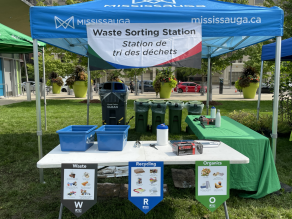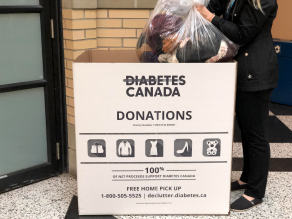Waste Not, Want Not – Reduce Waste and Combat Climate Change this October
Environment | October 6, 2022
October is Circular Economy Month. The circular economy model works to reuse, repair, refurbish, repurpose or recycle products and materials. In other words, in a circular economy, nothing is wasted. If a product is near the end of its life, its materials can be donated in their original form or can be reused for other purposes. It helps our environment by reducing the amount of materials going to landfill and the amount of raw items needed to make the material again. This helps address climate change, prevents waste and reduces pollution.
While landfills exist for material with no other reusable options, there is still a significant amount of items that show up in landfills that don’t belong there. In fact, as of last year, about 48 per cent of material that ends up as garbage in the Peel Region is salvageable. This is whether it’s a pair of jeans that could have been donated, a bike that could have been repaired or an aluminum pop can that could have been recycled. That’s why sorting your waste first is a basic, essential step to supporting a circular economy.
About 50 per cent of all residential waste is already being diverted from landfill through Peel’s recycling, green bin and yard waste programs, as well as other diversion initiatives. This is great progress, and the City of Mississauga is taking steps to help divert even more waste.
One way to help reduce methane emissions is to divert organic waste – like food, yard waste and paper – away from landfills and process it at composting facilities. This summer, the City diverted 1,900 kilograms of organic waste alone at the 2022 Ontario Summer Games and Ontario Parasport Games by setting up waste sorting stations at all participating cafeterias. Volunteers successfully sorted garbage, recycling and organics. Organic waste was sent to the Region of Peel’s compost facility to be turned into food grade compost. This compost can now be used to grow fruits and vegetables – closing the loop on a circular economy process.
The City is committed to advancing waste diversion initiatives and establishing circular economy principles and practices to help achieve climate change goals. In 2021, the City participated in the Circular Cities and Region Initiative’s Peer-to-Peer Network with participating communities in Canada, to share best practices for implementing circular economy strategies and policies. This will help build upon circular economy initiatives, like the Hazel McCallion Central Library renovation project that successfully diverted more than 120,000 kilograms of materials from landfill. City staff were able to reuse, recycle and donate a number of items to reduce environmental impacts. Another waste diversion project at the Living Arts Centre successfully donated more than 4,000 kilograms of items like chairs, tables and benches.
Celebrate Circular Economy Month and Waste Reduction Week
In addition to Circular Economy Month, the City is also celebrating Waste Reduction Week. The City is partnering with Partners in Project Green to host a Recycling Collection Drive for clothing, textiles and electronics.
From October 10 to 23, Mississauga residents can drop off unwanted clothing, textiles and electronics in bins located at various City facilities. You can donate things like hats, bags, belts, ties, footwear, bedding, pillows, linens, curtains and sleeping bags. Electronics will be collected in a separate bin and accepted items include laptops, computers, printers, keyboards, mice and handheld devices.
All clothing items will be donated to Diabetes Canada and all electronics will be recycled by Electronic Recycling Association.
Drop-off locations include:
- Churchill Meadows Community Centre
- Clarkson Community Centre
- Erin Meadows Community Centre
- Frank McKechnie Community Centre
- Huron Park Recreation Centre
- Malton Community Centre
- Meadowvale Community Centre
- Mississauga Valley Community Centre
- River Grove Community Centre
- South Common Community Centre
Learn more about the Clothing and Electronics Recycling Collection Drive.
Looking for ways to reduce waste at home?
- Recycle items: Acceptable recyclable items include paper items, plastic and glass bottles, milk and juice bottles and cartons, juice boxes and glass and metal containers and packaging.
- Repair what’s broken: You can extend the life of items like clothing, appliances and electronics by repairing them instead of buying new.
- Purchase wisely: When shopping for groceries, plan your meals so you know exactly which ingredients you need to buy. You can also look to purchase products with less packaging or recyclable packaging. When shopping, consider not taking items like bags, receipts, condiments or cutlery, unless you’re going to use them.
- Compost your organic waste: Fruit and vegetable scraps, eggshells, coffee grounds and napkins can all be composted in green bins instead of going into your garbage bin.
- Reuse items when possible: Use reusable bags for shopping and reusable bottles and mugs instead of single use ones. Consider shopping at thrift stores or garage sales.
- Find ways to repurpose items: Look for opportunities to reuse items in different ways like old jars as food storage, vases or a place to store snacks.
- Borrow or rent items: Consider borrowing items less frequently used like tools, party supplies, camping equipment, board games, sports equipment, movies, books or clothing. Our libraries offer a variety of different items to borrow, not just books. Some items like movies you can take home to borrow and others like sewing machines can be used on site through the Maker Space program.
Learn more about how Mississauga is leading climate change efforts and other environmental sustainability initiatives through the Climate Change Action Plan and Living Green Master Plan.
Tags
Media contact
City of Mississauga Media Relations
media@mississauga.ca
905-615-3200, ext. 5232
TTY: 905-896-5151

